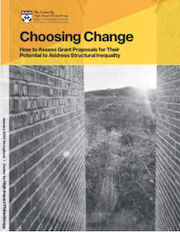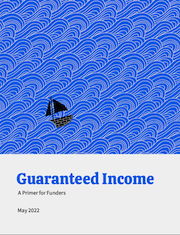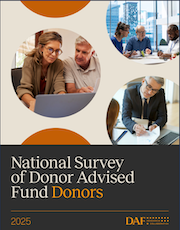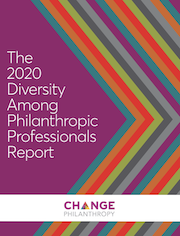Site Search
- resource provided by the Forum Network Knowledgebase.
Search Tip: Search with " " to find exact matches.


When considering how to improve health outcomes for low-income individuals, most people think about providing access to good medical care and keeping the cost of that care as low as possible. What people rarely think about is the connection between good health and quality affordable housing.
Kessler Foundation approved approximately $2 million in grants in 2021 to support initiatives that promote the inclusion of people with disabilities in the workplace. The Foundation allocated funding for three categories: Foundation-Directed Grants, Community Employment Grants, and Special Initiative Grants. Since 2005, the Foundation's Center for Grantmaking has awarded more than $50 million to nonprofit programs that expand employment opportunities for people with disabilities striving to work, adding diversity to American workplaces, and boosting productivity.
Kessler grantmaking has lead to improved job skills and paid employment for thousands of individuals with disabilities.
The Foundation's contributions have led to improved job skills and paid employment for thousands of individuals with disabilities, according to Elaine E. Katz, MS, CCC-SLP, senior vice president for grants and communications at Kessler Foundation. "Our grants support inventive initiatives that open new pathways to increasing inclusion of people with disabilities in the workplace," she added.
The Healthcare Foundation of New Jersey (HFNJ) is pleased to announce that it has awarded $2,802,521 to twenty New Jersey nonprofit organizations in its third quarter grant cycle of 2023. The total includes renewal funding for 15 projects that had previously been awarded grants from HFNJ, and first-time funding for five new projects.
The projects reflect the many diverse areas in which HFNJ works to fulfill its mission of improving the health and well-being of individuals in Newark and its environs and the Jewish community of Greater MetroWest, NJ. Programs providing vision care for children; dental care for veterans; care for individuals experiencing homelessness; the provision of healthy foods; and more will be supported by the grants awarded this quarter.
The Bridging The Gap: Blacks in Philanthropy conference, is organized by the Smith Family Foundation.
Their mission for this conference is to promote philanthropy and drive social change in the community, and this event is a vital step toward achieving that goal. The conference is expected to draw over 300 attendees, including philanthropy professionals, non-profit executives, community leaders, and interested individuals. The agenda features keynote speeches, panel discussions, workshops on racial equity, diversity, and inclusion in philanthropy, and strategies for advancing social justice. This conference is a unique opportunity to engage in collaborative discussions, gain valuable insights, and build meaningful connections with like-minded individuals who share a passion for creating positive change. Together, we will explore innovative strategies, best practices, and impactful initiatives that empower and uplift black lives.
Cost: $100
Open to all Grantmakers

This report offers a comprehensive look into the characteristics and perspectives of individuals and families who utilize DAFs for their charitable giving in the United States. The study surveyed over 2,100 DAF donors, focusing on their demographics, financial characteristics, giving patterns, decision-making processes, motivations for using DAFs, and the role of DAFs in their overall philanthropic strategy.

This second edition of the Diversity Among Philanthropic Professionals (DAPP) Report offers a snapshot of the philanthropic sector’s workforce in a very specific space and time — in the chaotic year that was 2020. The DAPP report aims to help the philanthropic community better understand its workforce and leadership. It is unique in soliciting anonymous self-reporting from individuals on the staff and board of participating foundations, helping grantmakers to accurately assess the culture and climate of their institutions.

Racial Equity Tools is designed to support individuals and groups working to achieve racial equity. This site offers tools, research, tips, curricula and ideas for people who want to increase their own understanding and to help those working toward justice at every level – in systems, organizations, communities and the culture at large.
The Center for Disaster Philanthropy is proud to partner with Foundation Center, the leading source of information about philanthropy worldwide, to present this interactive dashboard, which provides an analysis of disaster-related funding by foundations, governments, corporations, and individuals. The data presented here illuminate funding trends, expose imbalances in where and when contributions are made, and can help donors make more strategic decisions about their investments in the full life cycle of disasters, including preparedness and recovery efforts.
On October 5, 2015, Building Public-Private Partnerships to Enhance Disaster Resilience: A Listening Session was convened by the Office of the Assistant Secretary for Preparedness and Response (ASPR) Division for At-Risk Individuals, Behavioral Health, and Community Resilience (ABC)and co-hosted with Grantmakers In Health (GIH). This is a summary of the final meeting report.
Creating a New World of Learning: A Toolkit for Changemakers is a guide to help individuals and organizations become active catalysts and creators of a new world of learning. This new world of learning will:
- Put learners at the center
- Leverage technologies and human capital in new ways
- Support anytime, anywhere learning
- Include a diverse range of institutions and organizations, not just schools.
It will also make it possible for all learners to develop deep knowledge and abilities to thrive throughout their lifetimes.
The New Jersey Council for the Humanities (NJCH) recently awarded $202,840 in Incubation and Action Grant funding to fifteen organizations. Incubation Grants help organizations plan, research, develop, and prototype public humanities projects and events. Action Grants help organizations implement a wide array of humanities-based projects, including public programs, exhibitions, installations, tours, and discussion groups.
Public humanities programming allows individuals to engage in lifelong learning and share in the exploration of history, values, cultures, and beliefs. NJCH supports and acts as a resource for cultural and service-oriented nonprofit partners as they bring the public humanities to the residents of New Jersey, harnessing the power of the humanities to strengthen communities.
